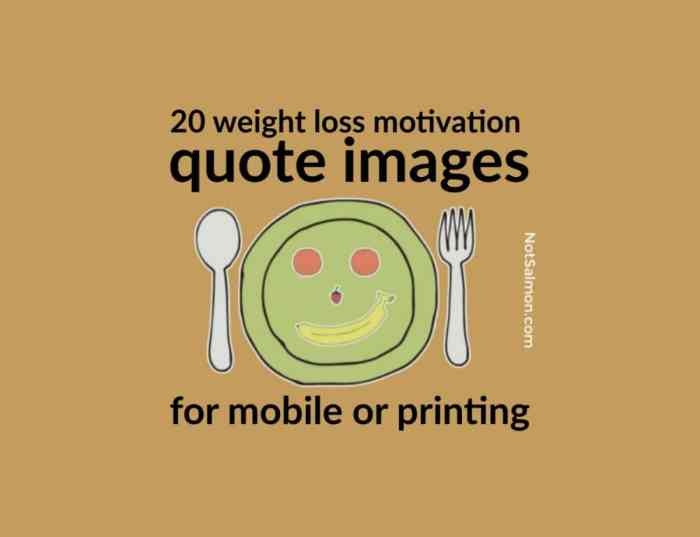Weight Loss Motivation takes center stage in this high school hip style exploration of how staying motivated can transform your health and well-being. Get ready to dive into the world of weight loss with a fresh perspective and actionable tips to keep you on track.
Benefits of Weight Loss Motivation
Weight loss motivation plays a crucial role in improving overall health and well-being. When individuals are motivated to lose weight, they are more likely to stay committed to their weight loss journey and make positive lifestyle changes.
Increased Adherence to Weight Loss Plan
- Individuals with high levels of motivation are more likely to follow their weight loss plan consistently.
- They are more inclined to make healthier food choices and engage in regular exercise routines.
- Motivation helps individuals overcome obstacles and stay focused on their weight loss goals.
Impact on Sustaining Long-Term Weight Loss Success
- People who are motivated to lose weight are better equipped to maintain their weight loss in the long run.
- They are more likely to adopt sustainable habits that support weight maintenance.
- Motivation helps individuals stay motivated even when faced with challenges or setbacks.
Types of Weight Loss Motivation

Whether you’re looking to shed a few pounds or embark on a major weight loss journey, finding the right motivation is key to achieving your goals. Let’s delve into the different types of weight loss motivation that can help you stay on track and reach your desired outcome.
Personal Goals
Setting personal goals is a powerful motivator for weight loss. Whether it’s fitting into your favorite pair of jeans or improving your overall health, having specific objectives can keep you focused and driven. Personal goals provide a sense of purpose and direction, making it easier to make healthy choices and stick to your weight loss plan.
Social Support
Having a strong support system can make a significant difference in your weight loss journey. Whether it’s friends, family, or a weight loss group, having people cheering you on can boost your motivation and hold you accountable. Social support provides encouragement, advice, and a sense of camaraderie, making the journey more enjoyable and manageable.
Health Concerns
Concerns about your health can be a powerful motivator for weight loss. Whether it’s reducing the risk of chronic diseases like diabetes and heart disease or improving your overall well-being, focusing on the health benefits of weight loss can keep you motivated. Knowing that you’re taking steps to improve your quality of life can provide the extra push you need to stay committed to your goals.
Intrinsic vs. Extrinsic Motivation, Weight Loss Motivation
Intrinsic motivation comes from within and involves pursuing weight loss for personal satisfaction or enjoyment. This type of motivation is driven by internal factors like a desire to feel healthier or more confident. On the other hand, extrinsic motivation comes from external rewards or consequences, such as wanting to impress others or avoid criticism. While both types of motivation can be effective, intrinsic motivation is often more sustainable in the long run as it is tied to personal values and beliefs.
Setting SMART Goals
Setting SMART goals is a proven strategy for enhancing motivation levels for weight loss. SMART goals are specific, measurable, achievable, relevant, and time-bound, providing a clear roadmap for success. By breaking down your weight loss goals into smaller, actionable steps, you can track your progress, stay motivated, and celebrate your achievements along the way.
Strategies to Boost Weight Loss Motivation
Maintaining motivation during weight loss journey can be challenging, especially when facing plateaus or setbacks. However, there are effective strategies to keep you motivated and on track towards your goals.
Tracking Progress and Celebrating Small Victories
Tracking your progress, whether it’s through keeping a food journal, measuring your body, or monitoring your workouts, is crucial for staying motivated. Seeing how far you’ve come can help you push through plateaus and setbacks. Celebrating small victories, such as losing a pound or fitting into a smaller size, can provide a sense of accomplishment and keep you motivated to continue your journey.
Positive Self-Talk and Visualization Techniques
Positive self-talk involves changing negative thoughts into positive affirmations. Instead of focusing on what you haven’t achieved, remind yourself of how far you’ve come and the progress you’ve made. Visualization techniques can also help boost motivation by imagining yourself reaching your weight loss goals. Visualizing the end result can make it feel more achievable and keep you motivated to stay on track.
Impact of Mental Health on Weight Loss Motivation

Mental health plays a crucial role in determining our motivation levels, especially when it comes to weight loss. Issues like stress, anxiety, and depression can significantly impact our ability to stay motivated and committed to our weight loss goals.
Connection between Mental Health and Lack of Motivation
- Stress can lead to emotional eating and poor food choices, derailing weight loss efforts.
- Anxiety may cause a lack of energy and focus, making it hard to stick to a workout routine.
- Depression can sap motivation and make it challenging to engage in healthy behaviors.
Building Resilience and Coping Mechanisms
- Practicing stress-relief techniques like deep breathing or yoga can help manage stress levels.
- Seeking therapy or counseling can provide tools to cope with anxiety and depression effectively.
- Engaging in activities that bring joy and relaxation can boost overall mental well-being.
Role of Self-Care Practices in Improving Motivation
- Implementing mindfulness techniques can help increase awareness of triggers for emotional eating.
- Regular meditation can aid in reducing stress and promoting a positive mindset for weight loss.
- Prioritizing self-care activities like adequate sleep and hydration can enhance overall motivation levels.